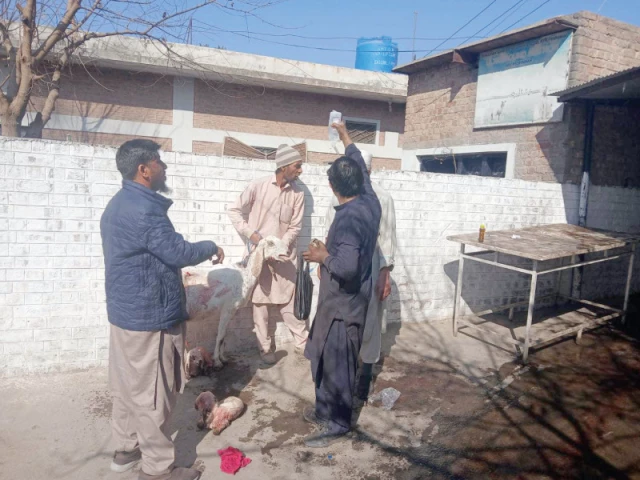Peshawar's veterinary hospital in critical condition
In the absence of critical facilities, injured or diseased animals are denied a new chance at life

Sheero had been part of the family for two years, a Russian cat raised with the same care as a child. But when he fell ill, growing weaker by the day, there was little Farhan could do. On Friday, he rushed his beloved pet to Peshawar's only veterinary hospital, hoping for emergency care. There were no diagnostic facilities, no real options. Hours later, Sheero was gone.
"My family and I were left traumatized by the death of the cat. I cared for Sheero like a parent and would rush him to private clinics and public veterinary hospitals. Sadly, due to the lack of facilities at veterinary hospitals, precious animals are dying on a daily basis," cried Farhan.
Similarly, Haris, who brought his German Shepherd to the only British-era veterinary hospital in Peshawar, told The Express Tribune that his dog used to be healthy and was vaccinated against rabies. "However, when my dog got worms in his feet and ears, I had to bring him to the hospital three times. Unfortunately, upon the third visit, the doctors proclaimed him dead. Although doctors were present in the hospital, there were no medicines or diagnostic facilities available for animals," informed Haris.
Although Haris' pet dog was a source of emotional fulfilment for his household, for Ghulam Kaka, an elderly milk supplier from Shabqadar, his cow was his family's primary source of sustenance. "My cow has not been able to stand for three weeks due to illness. With great difficulty, I brought her to the hospital after spending Rs5,000 as fare. The doctors prescribed medicines worth Rs13,000 for three months, which is unaffordable for me. If the disease had been diagnosed on time and medicines made available, this day would not have come," bemoaned Kaka, who left the hospital in tears.
As per sources from the Veterinary Section of the Livestock Department, thousands of birds, pets and cattle die each year in Khyber-Pakhtunkhwa due to the lack of vaccination arrangements and paucity of research on new viral diseases however, no government official has paid any attention to the problem.
The Express Tribune visited Peshawar's veterinary hospital where shocking revelations emerged. An X-ray machine purchased 20 years ago had been out of order for many years due to which animals could not receive a diagnosis. Similarly, a CT scan machine was listed in the hospital's documents, but it had not been used for two years. Therefore, when animals were brought in with serious injuries, they were sent to expensive private labs for testing, which the poor often could not afford. Thus, animals with diseases or severe injuries would die without treatment.
On a similar note, the bed of the operation theater could not be changed since the regime of the ANP due to which the rusting operation theater was a hotbed of diseases. To make matters worse, the staff did not have medical suits or gloves. Only small animals would undergo caesarean, emergency deliveries or minor surgeries. But for this too, all the supplies had to be brought from outside. During the three-day visit, not a single animal was seen to be under treatment in the operation theatre, apart from a puerpera goat receiving an intravenous medication after delivering two kids in the veranda.
According to data obtained from the Department of Livestock for 2024, approximately 2.5 million animals are present in K-P, including private and government pets, domestic cattle, cows, goats, lamb, donkeys, horses, cats, dogs, rabbits and chickens. However, only a budget of Rs3 million has been approved for their vaccination and treatment.
Analyzing these numbers, it is safe to say that even an inexpensive syringe or needle cannot be bought for all animals. Furthermore, vaccinations and medicines for pets are also not available, while even big animals do not receive any medication from the hospital apart from intravenous infusions for diarrhea.
Commenting on the matter, a Grade 17 officer from the Livestock Department revealed on the condition of anonymity that despite repeated reminders to the government, funds for animal healthcare were not received. "The treatment of birds, cattle and pets is not possible with the little money disbursed," noted the official.



















COMMENTS
Comments are moderated and generally will be posted if they are on-topic and not abusive.
For more information, please see our Comments FAQ